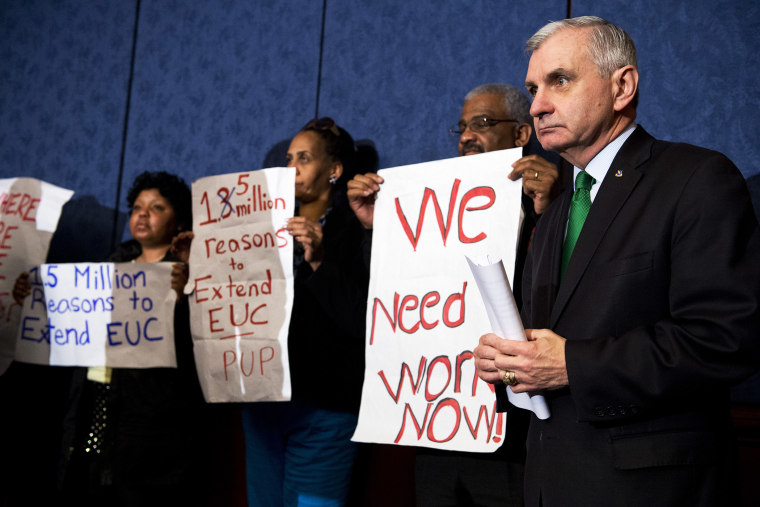In early April, the Senate
approved a bipartisan compromise to extend federal unemployment benefits. It was a welcome breakthrough after congressional Republicans cut off jobless aid for roughly 1.3 million Americans a few days after Christmas.
But almost immediately, House GOP leaders vowed to kill the proposal, and they kept their word. Even now, as the number the number of adversely affected Americans
tops 3 million, the Republican-led House won't even vote on the legislation.
The Senate's bipartisan duo are taking another stab at reviving long-term unemployment insurance benefits. On Tuesday morning, Sens. Dean Heller (R-Nev.) and Jack Reed (D-R.I.) will introduce their latest response to the expiration of extended unemployment benefits last December. But there will be a key distinction from previous iterations: The benefits will not be retroactive.
To be sure, this bill is worse than the original Reed/Heller plan, precisely because the original included retroactive benefits and this one doesn't. The significance of retroactive benefits was to ensure that Americans struggling to find work weren't punished by Congress for no reason.
But for the bipartisan senators, the new idea is to scale back and present a less ambitious plan. If the House Republican leadership wouldn't consider a good bill, the idea goes, maybe it'll feel better about a worse one.
If passed, the new legislation would allow any unemployed American whose federal aid was cut off in December to receive unemployment insurance payments for as many weeks as they had remaining of eligibility when the benefits ceased. "This means the benefits will be available going forward for the long-term unemployed, and those that were cut off when the program expired will be able to pick up where they left off," Reed said in a statement provided to the Washington Post on Friday. "So, for instance, if you were eligible for 6 more weeks of EUC benefits when the program was cut off on December 28, and you are still looking for a job now, you are eligible to receive federal UI help for those 6 weeks. Our goal is to try to help those out of work get the help they need." Under the new legislation, the cost of the restored benefits would be paid for through offsets that include extending "pension smoothing" provisions from the 2012 highway bill (MAP-21), which were set to phase out this year, and extending Customs user fees through 2024.
It's important to note that Reed or Heller aren't necessarily to blame for making the bill worse on purpose. In fact, they still support their original bill and have pushed for at least a House vote. But they concluded that a weaker bill stands a better chance of passing, so this is their Plan B.
As much as I'd like to tell the long-term unemployed that this new bill offers at least some hope, the truth is that everyone involved should keep expectations low.
House Republicans haven't said they'd consider the bill if senators watered it down; they've said they're against extended jobless aid on principle. One prominent GOP lawmaker went so far as to say it's "
immoral" to extend jobless aid to "long-term unemployments [
sic]."
Still, some movement is better than no movement? Stay tuned.
